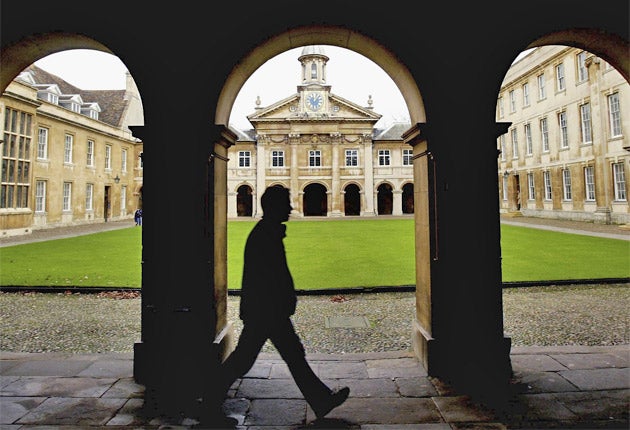Cambridge to charge £9,000 – and expects others to follow lead

Cambridge University has led the way in becoming the first higher education institution to announce plans for charging the maximum £9,000-a-year fee for all its courses. It made it clear that one of the main reasons was that it expected "most if not all of our peers to charge the maximum".
A university working group concluded: "To charge less than the maximum would be fiscally irresponsible." Even the maximum charge would leave it "carrying the burden of a significant loss per student".
Cambridge's move, which still has to be ratified by its council, is the first public confirmation that any hopes by the Government that it will be "exceptional" for universities to charge the maximum fee are wide of the mark.
The likelihood is that all 20 members of the Russell Group, which represents the most research-intensive universities, and a significant number of others, will opt for the maximum charge for the majority of their courses.
Oxford University, which is also widely predicted to opt for the maximum, also began the first stage of its fee-fixing process with a debate between academics and students at its Congregation, the university governing body.
Tomorrow the Business Secretary, Vince Cable, and the Universities minister, David Willetts, will publish guidance to the Office For Fair Access (Offa), which regulates fees, on how it should judge applications to charge more than the £6,000-a-year minimum charge set out in legislation. Vice-chancellors are expected to be told they must come up with concrete proposals to offer more places to disadvantaged pupils .
They will be told it is "valid and appropriate" to offer places to pupils who achieve below their standard grades if they show academic potential.
Cambridge plans to offer means-tested reductions to students whose families earn less than £25,000 a year. They will be charged £6,000 a year and offered a bursary of £1,625.
Students whose families earn between £25,000 and £42,000 will also qualify for a discount.
The Cambridge working group is setting a target to increase the proportion of students it admits from state schools from 58 per cent to between 61 and 63 per cent. The new fees will come into force from September 2012.
The working group, whose plans are now out for consultation with staff and students, said charging anything lower than the maximum "might raise questions about our commitment to excellence since a reduced fee in the long term could only be sustained by reducing costs and hence quality".
A Cambridge spokesman said: "The report and consultation will help the university's council decide what arrangements it wishes to propose for the fees, financial support for students and access provisions to Offa by its deadline of 31 March."
Aaron Porter, president of the National Union of Students, has warned that the majority of universities will go for the maximum charge. He estimates around seven out of 10 of those he has spoken to are ready to recommend it.
Last week John Denham, Labour's Business spokesman, accused Mr Willetts of being "two-faced" for telling MPs the £9,000 fee would only be levied in "exceptional" circumstances but neglecting to spell that out in draft guidance to Offa. Mr Denham said he did not expect "exceptional circumstances" to mean that "20, 30 or 50 universities" would charge the maximum.
Sir Martin Harris, director general of Offa, has said he will be bound by the government guidance.
Join our commenting forum
Join thought-provoking conversations, follow other Independent readers and see their replies
Comments